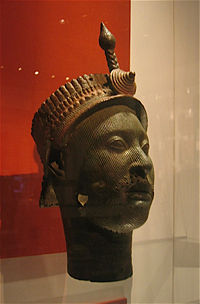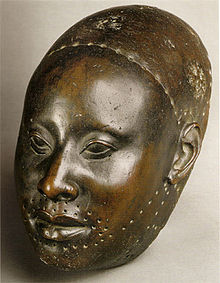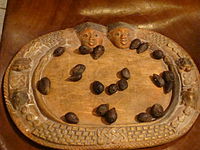- Yoruba traditional art
-
 Ife bronze casting of a Kings head currently in the British Museum
Ife bronze casting of a Kings head currently in the British Museum
The Yoruba of South Western Africa (Benin Republic, Nigeria and Togo, also including parts of Ghana, Cameroon and Sierra Leone), have a very rich and vibrant artisan community, creating traditional and contemporary art.[1] The custom of art and artisans among the Yoruba is deeply rooted in the Ifá literary corpus, indicating the orishas Ogun, Obatala, Oshun and Obalufon as central to creation mythology including artistry (i.e. the art of humanity).
Over the years, many have come to merge foreign ideas of artistry and contemporary art with the traditional art forms found in West Africa.
The traditional art forms among the Yoruba include but are not limited to: beading, braiding, tattooing, clay moulding and ceramic work, bronze casting, weaving and dyeing, sculpting, etc.
There is also a vibrant form of customary theatre known as Alarinjo that has its roots in the medieval period and that has given much to the contemporary Nigerian film industry.
Metal arts
Yoruban blacksmiths create sculpture from iron, through hand-beating, welding, and casting. Ogun is honored as the god of iron.[2]
Metalworkers also create brass sculptures by lost-wax casting. Brass is seen as being incorruptible by the Ogboni Society.[2]
References
- ^ "The Place of Susanne Wenger's Art in Yoruba Religion". http://www.africaresource.com/ijele/issue5/olajubu.html. Retrieved 2008-02-25.
- ^ a b "Shaping: The Blacksmith." Cutting to the Essence – Shaping for the Fire. 29 March 1995 (retrieved 15 Nov 2011)
External links
- Emodying the Sacred in Yoruba Art, Newark Museum
- Nigerian Traditional Arts, Crafts and Architecture
- Yoruban and Akan Art in Wood and Metal, Lakeview Museum of Arts and Sciences
Deities Supreme BeingCountries Nigeria · Cuba-Puerto Rico · Trinidad · Brazil · United States · Colombia · Venezuela · Mexico · BeninTopics Sacred sites Legendary figures Categories:- African art
- Yoruba culture
- Indigenous art
Wikimedia Foundation. 2010.


